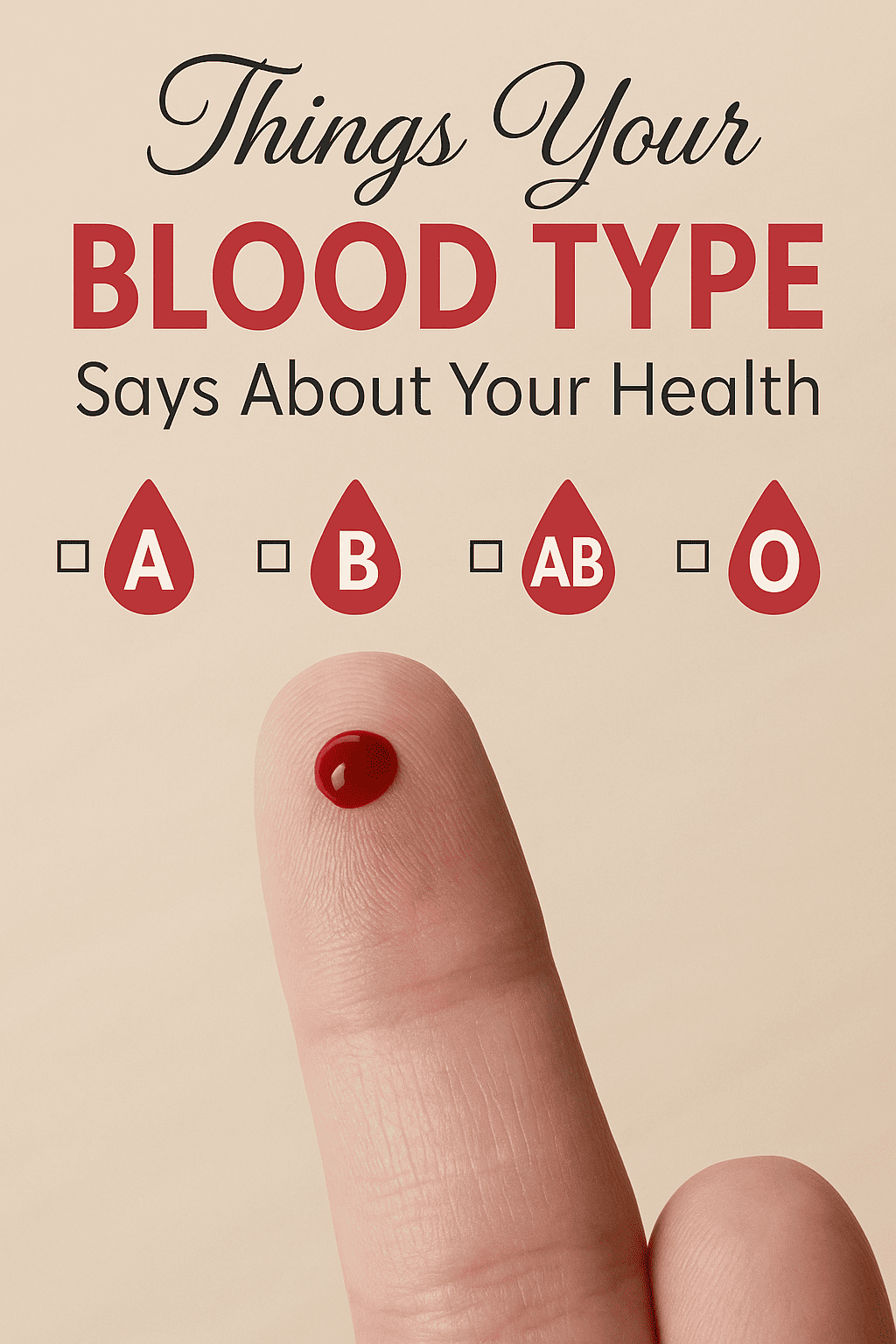ADVERTISEMENT
ADVERTISEMENT
ADVERTISEMENT
Introduction: Why Blood Type Matters
Your blood type is more than just a label used for transfusions — it’s a biological signature that can influence various aspects of your health. Blood types (A, B, AB, and O) are determined by specific molecules called antigens on the surface of red blood cells. These antigens interact with your immune system, and research suggests that they may play a role in disease susceptibility, cardiovascular health, and even your body’s response to infections.
While your blood type doesn’t determine your destiny, it can offer insight into how your body might react to certain conditions or medical risks.
Understanding Blood Types and the ABO System
The ABO blood group system was first discovered by Karl Landsteiner in 1901. It classifies blood based on the presence or absence of A and B antigens on red blood cells:
-
Type A: Has A antigens and anti-B antibodies.
-
Type B: Has B antigens and anti-A antibodies.
-
Type AB: Has both A and B antigens, and no antibodies — the “universal recipient.”
-
Type O: Has no A or B antigens, but both anti-A and anti-B antibodies — the “universal donor.”
These antigens are not only important for transfusions but also play a role in how your immune system identifies and reacts to foreign substances.
How Blood Type Affects Disease Risk
1. Heart Disease
Studies have shown that non-O blood types (A, B, and AB) may have a slightly higher risk of heart disease. This is likely due to higher levels of a blood-clotting protein called von Willebrand factor (vWF) and Factor VIII, which can increase the risk of thrombosis.
2. Cancer Risk
Research indicates that people with blood type A may be more prone to certain cancers, such as stomach and pancreatic cancer, possibly due to differences in immune response and how Helicobacter pylori bacteria attach to stomach lining cells.
3. Infection Susceptibility
People with type O blood may have some resistance to severe forms of malaria, while type A individuals could be more susceptible to certain viral infections like smallpox or norovirus, based on how pathogens interact with blood group antigens.
Blood Type and Cardiovascular Health
Blood group O individuals tend to have a lower risk of cardiovascular disease due to reduced clotting factors and lower cholesterol levels. Conversely, people with types A and AB may face higher cholesterol and blood pressure levels, although lifestyle and genetics play a much larger role than blood type alone.
A 2012 study in Arteriosclerosis, Thrombosis, and Vascular Biology found that people with type O blood had a 23% lower risk of heart disease compared to non-O types.
Blood Type and Digestive Health
Certain blood types may influence how your digestive system processes food and how your gut microbiome develops.
-
Type A: May produce lower amounts of stomach acid, which can slow digestion of meat and protein-rich foods.
-
Type O: Typically has higher stomach acid, aiding protein digestion but potentially increasing ulcer risk if infected with H. pylori.
-
Type B: Often shows a more balanced digestive profile, tolerating dairy products better due to evolutionary adaptation.
It’s important to note that while the “blood type diet” gained popularity, scientific evidence supporting it remains limited and inconclusive.
Blood Type and Immunity
Blood type antigens act as immune markers, and they may influence how your body reacts to pathogens. For example:
-
During the COVID-19 pandemic, some studies suggested that type O individuals had a slightly lower risk of infection or severe outcomes compared to type A, though findings were mixed and not definitive.
-
Type AB, being rare, may have a more complex immune response, since both A and B antigens can influence antibody production and immune recognition.
Overall, your immune system is shaped far more by genetics, lifestyle, and environment than by blood type alone — but understanding your blood type can still help in risk assessment and preventive care.
Blood Type and Transfusions
From a clinical perspective, knowing your blood type is vital for safe blood transfusions. Mismatched transfusions can cause severe and life-threatening immune reactions.
-
Type O-negative is the universal donor, compatible with all other blood types.
-
Type AB-positive is the universal recipient, able to receive blood from any type.
These compatibility rules also apply to organ transplants, where antigen matching plays a critical role in preventing rejection.
Myths vs. Science: What Blood Type Doesn’t Say
There are many myths linking blood type to personality, diet compatibility, or exercise style — especially popular in some cultures. However, there’s no scientific evidence that blood type affects personality traits, intelligence, or behavior.
What is proven, however, is that blood type influences medical compatibility, disease susceptibility, and immune responses — areas where science continues to explore deeper connections.
Practical Takeaways
-
Know your blood type. It’s crucial for medical emergencies and transfusions.
-
Understand your risks. Non-O types may have higher clotting risks, while type O may have higher ulcer risks.
-
Lifestyle matters most. Regardless of blood type, balanced nutrition, regular exercise, and preventive health checkups are the biggest determinants of long-term wellness.
-
Stay updated. Research into blood type and disease continues — especially in fields like infectious diseases, organ transplants, and cardiovascular medicine.
Conclusion
Your blood type doesn’t define who you are, but it can offer valuable insight into how your body interacts with diseases and medications. Understanding these connections helps both patients and healthcare providers take a more personalized approach to prevention and treatment.
So, next time you see your blood type on a medical chart, remember: it’s not just a label — it’s a key piece of your biological identity that holds important clues to your health.
For more Recipes follow me in Facebook , Pinterest !
ADVERTISEMENT

